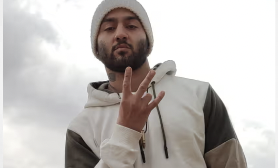The Guardian
Musician, 33, faces retrial after being sentenced to death for ‘corruption on Earth’
Iran’s supreme court has overturned the death sentence imposed on the rapper Toomaj Salehi, his lawyer said.
The decision comes in the middle of Iran’s presidential election campaign but seems unrelated to the fierce public debates under way about Iran’s future direction, including the rights of women not to wear the hijab if they wish.
“Salehi’s death sentence was overturned,” the rapper’s lawyer, Amir Raisian, said in a post on X, adding that the supreme court had ordered a retrial.
In April, an Iranian court sentenced Salehi to death on the capital offence of “corruption on Earth”, Raisian said at the time. The rapper was also found guilty of “assistance in sedition, assembly and collusion, propaganda against the state and calling for riots”, the lawyer said.
Salehi, 33, was arrested in October 2022 after publicly backing demonstrations, which had erupted a month earlier after the death in police custody of Mahsa Amini.
A host of western celebrities gathered by Index on Censorship, including the author Margaret Atwood, the band Coldplay and the singer Sting, had called for his release.
After his arrest, Salehi spent a year and 21 days in prison, including 252 days in solitary confinement. Following his release on bail, he described being “severely tortured” during his time in prison. He was arrested again two weeks later, in December 2023, and charged with “corruption on Earth”.
The precise terms of his death sentence were contested by some Iranian authorities, who said the supreme court at the time of sentencing had added that he deserved clemency due to his youth. He may still face a long prison sentence.
Index on Censorship, Human Rights Foundation and Salehi’s international legal team at Doughty Street Chambers said: “While the supreme court’s decision is an important correction to Mr Salehi’s cruel and unlawful treatment, it is critical that his rights are properly respected.
“Mr Salehi’s case has been returned to Branch 1 of the Isfahan revolutionary court for resentencing. Even a shorter period of imprisonment would be an injustice: Mr Salehi has done nothing other than to call for his, and other Iranians’, fundamental rights to be respected. He must be free to continue his music and seek the necessary medical care he needs following his imprisonment, free of any continued imprisonment, harassment or persecution.”
Salehi’s cousin, Arezou Eghbali Babadi, and his friend and manager of his social media accounts, Negin Niknaam, made a joint statement, saying: “The international community’s solidarity and support have played a crucial role in the release of Toomaj Salehi.
“We extend our heartfelt gratitude to all who contributed in any way to this outcome. However, we must not lose sight of the unlawful and oppressive rules that continue to exert severe psychological pressure on freedom seekers, their families, and society as a whole in Iran.
“While we urge for Toomaj’s unconditional freedom and look forward to seeing him as soon as possible, we cannot forget the injustices we faced during this period.”
Salehi has previously said Iranians “are living somewhere horrific. You are dealing with a mafia that is prepared to kill an entire nation in order to keep its power, money and weapons.”
His uncle Iqbal Iqbali, who lives in Germany, said Iran was “at a stage where the explosion of the anger of the Iranian people against boundless tyranny is imminent”.
The presidential elections are due to be held next week and there have been increasingly bitter confrontations between the one reformist candidate, Masoud Pezeshkian, and five conservatives of different persuasions. The rows have included TV debate walkouts, the daughter of one candidate denying they had been on luxury shopping trips to Turkey, and the jostling of Javad Zarif, the former foreign minister who is supporting Pezeshkian.
There have also been arguments about the causes of widespread poverty, enforcing the hijab, internet filtering and the role of Iran’s nuclear activities in leading to sanctions, but little has been said about the judicial system’s treatment of dissidents.
Pezeshkian is battling to persuade disillusioned Iranians that it is worth voting. Polls show him doing well enough to get into a runoff, where he would probably lose to one of the hardliners.




